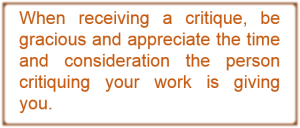Making the Best of Critiques
(Whether Offering or Receiving It)
Critique is a hard thing to deal with. In my wish to become a successful writer I had to learn, not only to deal with, but appreciate it. I’m no masochist. Nonetheless the more I develop as a writer, the more appreciative I am of a good, straight to the point critique. Certainly my goal is to become good enough to receive some praises amidst the criticism. Still I know the path is long. Regardless how brilliant an author may be, it’s impossible to please all readers. The trick is to develop a thick skin.
Critique, according to the Merriam Webster dictionary, simply means “a careful judgment in which you give your opinion about the good and bad parts of something (such as a piece of writing or a work of art).”
If you read farther on the Merriam Webster website you will learn that “Critique is an alteration of an archaic word that referred generally to criticism. Critique itself dates to the early 18th century and originally referred to a piece of writing that criticized a literary or artistic work. The words criticism, critique, and review overlap in meaning. Criticism usually means “the act of criticizing” or a “remark or comment that expresses disapproval,” but it can also refer to the activity of making judgments about the qualities of books, movies, etc. (as in “literary criticism”).Critique is a somewhat formal word that typically refers to a careful judgment in which someone gives an opinion about something. Review can refer to an essay analyzing a literary or artistic work, but can also sometimes imply a more casual or personal opinion.”
As in most things in life, there’s more than one Point Of View to a critique, actually there are two: the POV of the writer of a piece, and the one of the person critiquing it.
 If you are offering your work to be critiqued – be specific; if you have a particular passage you would like to have critiqued post only that passage. If you prefer to offer more for context, which can be helpful, make an observation at the top of your posting letting the forum members, writers group, etc. know of your particular focus.
If you are offering your work to be critiqued – be specific; if you have a particular passage you would like to have critiqued post only that passage. If you prefer to offer more for context, which can be helpful, make an observation at the top of your posting letting the forum members, writers group, etc. know of your particular focus.
If you wish to receive help with your grammar, punctuation, etc., you should let critique givers know as well, but beware of the level of the writers you are working with. Basic English writing issues may be better addressed by a copy editor. Before subjecting your work for critique it’s a good idea to line edit it to the best of your ability so the comments will add to the development of characters, setting, plot, etc. It all depends on the person or group you are sharing your work with being open to help you clean up the mechanics of your writing.
Above all be gracious and appreciate the time and consideration the person critiquing your work is giving you, in most cases for free, in a day and age where time is money. Pride, prejudice and denial never serve us well, but in the particular case of a critique they can prevent us from making the best possible use of comments that can potentially help our work go from OK to great. Understanding that the person critiquing has the best intentions for the piece helps make the punch bearable. So read the critique with open mind and take it for what it is; a one person opinion of your work that may have some good pointers on how to make it better overall.
If you’re critiquing – start in a positive note by pointing at least two good things in the piece, use examples from the work, like an engaging open sentence. Praise grammar precision, well developed characters, settings, scenes, etc.
When critiquing a piece from a writer new to you, it’s a good idea to praise the writer for the courage in offering the piece to be critiqued acknowledging how hard it is to do so. Make it clear the comments that follow are in the best interest to the development of the work. Remember how exposed you feel when offering your work to be critiqued.
It’s a good idea to start with a summary stating what you think the piece is about and pointing to any perceived meaning that jumped out of the text to you.  That helps the writer know if the themes being explored are coming across. Always critique the piece, never the writer. For example: this piece would benefit from… I didn’t understand this passage… Make your feedback positive and specific in language and meaning, use examples from the piece being critiqued and offer possible ways for improvement. Ex: This sentence, “…,” has a lot of information that would be interesting to know from the beginning.
That helps the writer know if the themes being explored are coming across. Always critique the piece, never the writer. For example: this piece would benefit from… I didn’t understand this passage… Make your feedback positive and specific in language and meaning, use examples from the piece being critiqued and offer possible ways for improvement. Ex: This sentence, “…,” has a lot of information that would be interesting to know from the beginning.
A good rule of thumb is to comment on three positive aspects of the piece and point three opportunities to make it better. If a writer is new to the process, too many pointers can be overwhelming and discouraging. A seasoned writer though, will be happy with a long, detailed critique. So gauge it accordingly. A fellow writer with whom you’ve been exchanging pieces for some time, or someone new to a writing group, will benefit from different styles of critique. Learning to critique to different sensibilities will improve your ability to make the best of the critiques to your own work and will ultimately make you a better writer.